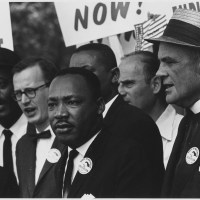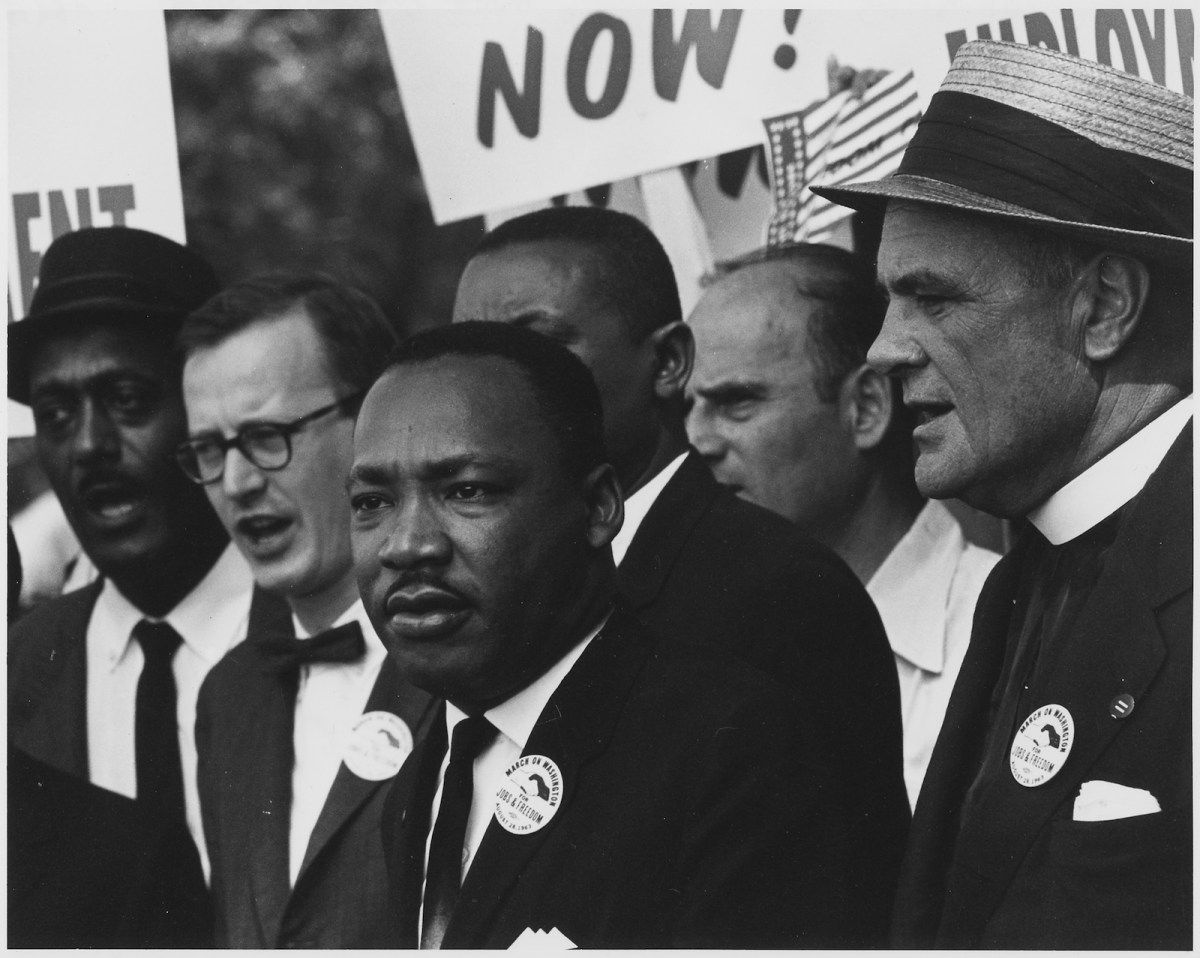Today, we celebrate the life and legacy of Dr. Martin Luther King, Jr. And while many enjoy a long weekend and social media feeds full of inspirational quotes, it’s not a holiday we all experience as equally enjoyable.
It can be troubling for many in the Black community (myself included) to watch as a nation celebrates King as a “Black history” icon, a symbol of unity for a day, and a reason to do some bargain shopping.
To do so is to critically minimize the gravity of his life and death—and to rewrite his story as a simple, one-dimensional narrative.
To place Dr. King on a pedestal for a single day is to overlook the complexity of the civil rights movement, and to casually dismiss our own role in his legacy.
Dr. Martin Luther King, Jr. was not a peacekeeper.
King was fueled by his vision of a more beautiful world. He knew that creating a nation where peace was for every person, black and white alike, required disrupting the illusion of peace that many white folks were content to live with. In Dr. King’s time, just a few decades ago, segregation wasn’t just the law, it was a set of values upheld by white Americans—in both southern and northern states.
Creating peace meant rewriting the false narrative that whiteness was superior to blackness. It meant dismantling the stories and structures that made violence against black women, men, and children seem acceptable, even to nice white people. It meant taking apart the world as it was and putting it back together as it should be.
Dr. King wasn’t a peacekeeper; he was a peacemaker, committed to restructuring the world as a place of real and lasting peace… for everyone.
Dr. King was not the great leader of a nation.
More than 200,000 people marched with Martin Luther King, Jr. and his fellow civil rights activists in 1963. But at the time of his assassination, King was unpopular in the court of public opinion.
He faced widespread rejection throughout his short life. Churches excluded him from their pulpits. Political leaders labeled him dangerous. Most people—most average, God-fearing Americans—disapproved of the movement he represented: the movement to make equality the law.
Dr. King was a leader, yes. But to follow him was to love and live in a way that few were willing to do.
Dr. King was not a beloved celebrity.
He was a public nuisance, a radical activist who called his fellow citizens to nonviolent resistance, speaking truth to power, and a higher responsibility to one’s neighbors.
He called for redistribution of power and resources and preached the necessity of working to end war, pointing out both the strengths and weaknesses of America.
Despite persecution, King refused to give up on making the nation he loved a better nation for everyone. Dr. King lived the nonviolence he preached—eyewitness accounts of a physical assault during a church meeting tell us that he refused to retaliate, or allow his colleagues to do so.
While he may have been more infamous than famous, Dr. King was relentlessly pressing in to create the more beautiful nation and world he knew was possible.
Dr. King was not a writer of great quotes.
As we are among the millions posting a few words by the great Martin Luther King, we will choose our favorite sound bites. But we neglect the context of these quotes, separated from his sermons and letters, at our peril.
“The time is always right to do right,” we will declare on our Instagram feeds. But when we reduce the speech from which these words were taken to a feel-good phrase, we diminish Dr. King’s broader message about our responsibility to dismantle white supremacy, to participate in social revolution, and take seriously the truth that our own freedom is tightly woven to the freedom of all our fellow humans.
Dr. King was a criminal—a black man jailed 29 times for breaking the laws he lived under.
Today, he might be labeled a thug by internet commentators or political leaders. Cable news might admonish him to be more respectful in his protests.
He’d likely be labeled dangerous—in fact, he was during his lifetime. Despite the fact that it cost him greatly—it meant losing his autonomy and his public image being vilified—King put his own body on the line as he publicly protested unjust policies, advocating for changes to laws that oppressed some members of US communities while prioritizing the comfort of others.
Dr. Martin Luther King, Jr. was not a superhero.
He had no supernatural power or indestructibility. He was a human being, just humaning with the rest of us.
Martin Luther King was someone’s ornery son, someone’s frustrating father, someone’s beloved husband, someone’s interesting neighbor. He was imperfect and often unsuccessful. But when he met seemingly insurmountable obstacles, he faced them in the name of justice and peace.
He didn’t solve problems by magic or might, but by love. His fight wasn’t against a supervillain, but against the evils of racism, poverty, and war—all of which continue to thrive today, and which we all have a role in both perpetuating and ending.
As we celebrate this weekend, joining millions of our American neighbors who recognize Dr. King as a heroic historical figure, what if we saw him instead as a person, waging peace with all the passion and courage and resources he had?
 And what if we saw ourselves in Dr. King’s legacy—considering honestly where we would have been as Dr. King marched from Selma to Montgomery in a demonstration for the rights of black and brown people in America?
And what if we saw ourselves in Dr. King’s legacy—considering honestly where we would have been as Dr. King marched from Selma to Montgomery in a demonstration for the rights of black and brown people in America?
Would we have been marching? Watching from across the street? Calling for him to protest in a way that made us more comfortable?
Would we have been switching the television channel because we’re tired of politics? Arguing with family members, asking why we have to make everything about race?
Dr. King was ridiculed, vilified, locked up, and eventually murdered—all for waging peace on the frontlines.
I think we’d all like to believe we would have been on the frontlines with him. I certainly would.
But most people weren’t joining the frontlines in Selma in 1965. Even those who thought they were good, kind people. Even those who said they believed in equality and justice.
The truth is, we probably wouldn’t have, either. But we have the chance to do it now. How far are we willing to go to do what love calls us to?
Let’s honor King’s full personhood by honoring the people it will cost us to honor. By being present and loving in the spaces in our communities where it’s uncomfortable.
But this is our chance.
We know that elevating the voices of black and brown people means hearing things we don’t want to hear about ourselves and our nation. But this is our chance.
We know it’s going to subject us to scrutiny and judgment to speak out against prejudice and injustice toward immigrants. But this is our chance.
We know the frontlines aren’t in front of our phone screens, but in our communities—showing up, standing up, and loving even (and especially) when it comes at a cost. And this is our chance.
“The aftermath of nonviolence is the creation of the beloved community. The aftermath of nonviolence is redemption. The aftermath of nonviolence is reconciliation.”
– Dr. King, The Birth of a New Nation, 1957
In a 1957 sermon, Dr. King famously gifted us with the wisdom that “hate cannot drive out hate: only love can do that.”
It can be comfortable to rest in the belief that the word love is interchangeable with words like kindness and compassion here. If only we are kind enough, compassionate enough, hate and injustice will disappear from our communities.
But this is an incomplete understanding of Dr. King’s message. If we look closer at the full transcript of his life, we are forced to recognize that he calls us to a love that is both compassionate toward the hurting and furious with the systems causing hurt. “Resistance,” he wrote, “is the courageous confrontation of evil by the power of love.” He calls us to a love that is both angry and active—a love that disrupts what is comfortable for what is right.
Let’s celebrate together this weekend, but in doing so let’s honor Dr. Martin Luther King, Jr. for the person he was, not just the quips he inspires. Let’s honor his full personhood by honoring the people it will cost us to honor, and being present and loving in the spaces in our communities where it’s uncomfortable.
And may we not be satisfied until we are all free, at last.


